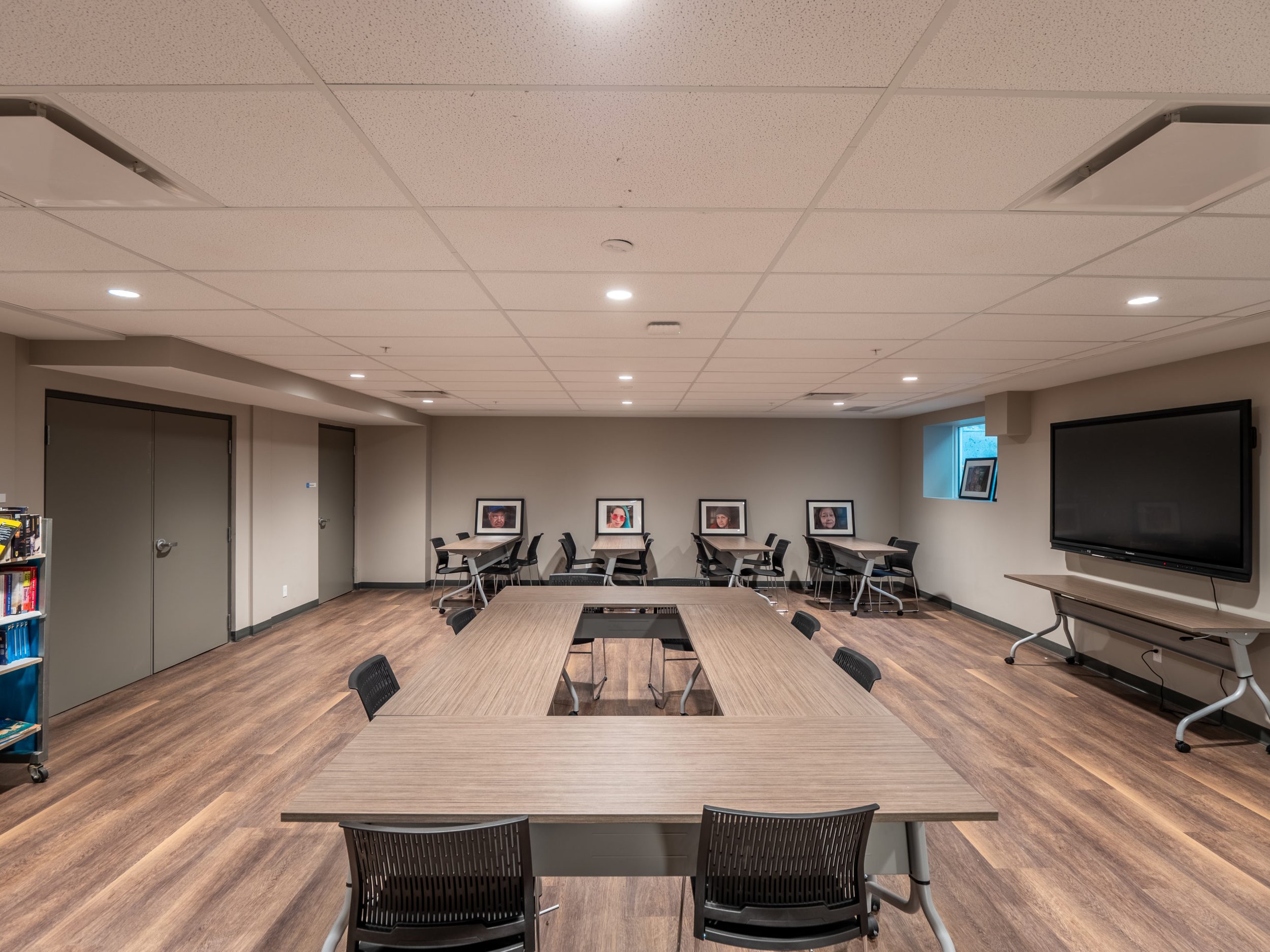EMERGENCY HOMELESS SHELTERS
The YWCA provides two types of emergency homeless shelters:
-
YWCA Niagara Region offers emergency housing for women and their children in a safe and home-like environment. We provide a private bedroom, shared common space and three healthy meals that offer nourishment and warmth.
We operate two, 20-bed emergency homeless shelters: 183 King Street, St. Catharines and 6135 Culp Street, Niagara Falls. Both locations are accessible 24 hours a day, seven days a week.
Any woman 16 years of age or older requiring shelter and support is welcome. Women’s Advocates are on duty 24 hours a day, seven days a week to assist guests in setting goals and accessing community resources in their search for stable housing as they continue on their path to independence.
-
The YWCA Niagara Region operates emergency homeless shelter units for two parent families and single parent families. We have four apartments in St. Catharines and two units in Niagara Falls. They all are 3-bedroom units. These units allow families to have the privacy they need in their time of crisis.
Families have their own kitchen and bathrooms but are asked to bring their own bedding and towels. While staying at the Family Shelter you are under the Hostel agreement and expected to search for permanent housing. The average stay is one month.
Advocates visit each family once a day and assist in finding permanent housing, accessing community resources. Advocates also liaise with other agencies on behalf of the family and lend a caring ear in times of need.
We ask that families bring identification for each shelter guest including children.
Call (289) 668-4962 for more information about utilizing the services of the YWCA Niagara Region’s emergency family shelter.
A tour of our Oakdale Commons, one of the many facilities we use to help those in need.
TRANSITIONAL HOUSING
We provide safe, subsidized transitional housing across the entire Niagara region.
Through their transition, clients work with skilled staff to set goals that will lead to more independence. The YWCA also provides residents with skills development training, support, goal setting, advocacy, and referrals to other programs and services that might be of benefit.
-
Operates out of the King St. & Culp St. Shelters
24/7 support from staff and women’s advocates
Skill Development Programs include coping skills, self esteem improvement and goal setting
Clients can stay in On-Site Housing for up to a year
-
• Operates as a fully subsidized Women’s Residence
• For women capable of living independently but still needing advocacy and support
• An advocate is on duty Monday – Friday, from 9-5 p.m.
• Skill Development Programs include resume building, job searching skills, apartment hunting skills, budgeting, advanced goal setting and other self esteem building programs
• Clients can stay in Supported Transitional Housing for up to a year
-
(Offered through partnerships with the Niagara Region and local landlords)
• Approximately 65 apartments throughout the Niagara region
• For clients ready to live independently
• Support available from a Support Worker as needed
• Support Workers help clients with setting and reaching goals
• The YWCA carries the lease for one year. At the end of one year, the client has the option to take on the lease and continues to live independently with a place to call home.
• NOTE: while the program operates in the same way all across the region, clients who are in the program in West Niagara can stay in it for up to three years as opposed to the one year in all other parts of the region
• Skill Development programs are available to anybody in the program
To apply for the Off-Site Transitional Housing program, download our application here. Please contact the coordinator of the location you’re interested in applying to for more information, as specified on the first page of the application. Note: We are only able to consider applications for individuals and families who are already on the Niagara Regional Housing waitlist.
ANTI-HUMAN TRAFFICKING
Human trafficking involves the recruitment, transportation, harbouring, and/or exercising control, direction, or influence over the movements of a person, for the purpose of exploitation. There are many types of human trafficking. Some of the most common types of human trafficking taking place in Niagara and Ontario include:
Sexual exploitation
Labour exploitation
Domestic exploitation
Human trafficking takes place nationally, within Canada, and internationally. As a Canada-USA border region, Niagara is an epicenter for human trafficking. Traffickers control their victims in various ways such as taking away their identity documents and passports, sexual abuse, threats, intimidation, physical violence, and isolation.
-
Indigenous women and girls; migrants and new immigrants; LGBTQ2S+ persons; persons living with disabilities; children in the child welfare system; youth and adults who are socially or economically disadvantaged.
Migrant workers may be particularly vulnerable to exploitation and abuse due to many factors, such as language barriers, working in isolated/remote areas, lack of access to services and support, and lack of access to accurate information about their rights
Young people ages 11-14
-
Education is an important part of preventing human trafficking. One of the biggest barriers to education for communities is recognizing that human trafficking is taking place right here in our own backyard. However, human trafficking can take place anywhere which is why it is important to educate youth and parents about the signs of human trafficking, how traffickers manipulate their victims and what to do if you think someone you know is being trafficked.
If you’re a parent looking for resources on how to talk to your children about human trafficking, visit the Canadian Centre to End Human Trafficking website for more information or download our Human Trafficking Prevention Guide
-
At the YWCA Niagara Region, we have been taking steps to support our community in the fight against human trafficking.
1. Building Partnerships: We have educated local firefighters, police officers, and doctors on how they can recognize sexual exploitation. Now more than ever, we’re able to facilitate important conversations with service providers, law enforcement and first responders, the hospitality industry, and politicians to create awareness around human trafficking.
2. Prevention: We work with members of our community and at-risk populations to recognize the reality of human trafficking in Niagara and educate youth on the signs of human trafficking.
3. Supporting Survivors: We work with survivors of human trafficking to provide resources and support to heal from their trauma and rebuild trust.
-
Summer of 2020 marked the opening of our safe house: “Home, to New Beginnings”.
“Home, to New Beginnings” is a safe house where up to 6 survivors of human trafficking can access secure housing and resources in a healing environment. This safe house fills a void of support for survivors of human trafficking that currently does not exist in Niagara and is the first of its kind in Ontario. “Home, to New Beginnings” supports survivors beyond the need for physical shelter, but also addresses the unique emotional needs of those who have experienced unthinkable trauma.
Named and informed by survivors themselves, our safe house meets survivors wherever they’re at in their healing journey. Survivors are so much more than their human trafficking story – they’re whole human beings with strengths and passions and futures. Our team is here to provide an opportunity for survivors to heal from their trauma on their own terms and provide the resources necessary to make it possible.
“Home, to New Beginnings” is a critical resource for survivors of human trafficking because the reality is human trafficking takes place right in our own backyard – here in Niagara. The rate of human trafficking incidents per 100,000 population is four times higher in St. Catharines-Niagara than the national average. Niagara functions as an epicenter of national and international human trafficking.
Through education, resources, and anti-human trafficking services, the YW works to end human trafficking through prevention while supporting survivors. With your support, we can end human trafficking and give survivors new hope for the future.
If you, or someone you know is being trafficked, call Canada’s National Human Trafficking Hotline at
1-833-900-1010.
SKILLS DEVELOPMENT CENTRE
The YWCA Niagara Region is proud to provide structured workshops through our Women’s Resource Centre that are specifically designed to provide a safe, empowering environment for learning. Skills Development programming is an excellent way to increase knowledge, build self-awareness, and enhance the skills that will be transferable as the client moves towards stability and independence. Skills Development programs are created, facilitated, and delivered in unique ways that ensure a realistic, fun, and interactive experience for the womxn we serve.
Participation in Skills Development programming is a requirement of the On-Site Transitional Housing program. Case Managers will assist their clients in identifying their specific programming needs and work with the Skills Development Facilitator to ensure that each client’s goals are being reached. Once the referral form is completed, the Skills Development Facilitator will reach out to the clients and provide program details along with a monthly calendar.
If you would like more information about the YWCA Skills Development Centre, please contact Kendra at (905) 246-4483 or kcooper@ywcaniagararegion.ca.
PROGRAMS FOR YOUTH
We believe in empowering and supporting kids and youth in our community. We offer workshops in schools all across the Niagara region, which address issues such as bullying and loving yourself. Many of our programs are run during lunch, and come with a free slice of pizza for those who attend. We offer two programs in schools; STEPS and Teen Talk on behalf of United Way Niagara. Our work with youth is part of our preventative work. It helps reduce the risks of kids harming themselves or making choices that put themselves at risk.
We are pleased to offer our newest program FACES to the youth currently living in our family shelter. This is an after-school group designed to give the youth in our shelters a safe space for playing, learning, and growing.
If you are curious to learn more about our workshops, please reach out to our Skills Development Team at 905-359-1045 or msnow@ywcaniagararegion.ca.
PROGRAMS FOR ADULTS
Our Skills Development Workshops respond to needs that are being identified on an on-going basis. They are offered to all of our guests and clients as well as to the community.
SEX TRADE ON MY TERMS (STOMT)
STOMT is a weekly drop-in centre for women who are engaged in survival sex work. The drop-in centre offers care packages for women, as well as clothing and a safe space to have good conversation and to access supports or referrals if needed.
WOMEN’S ADDICTION RECOVERY MEDITATION (WARM)
With WARM, women are given the opportunity to access intervention and prevention services while living at home, maintaining a job and family responsibilities and creating a schedule that works for them.
WARM values the unique needs of every woman, addressing issues significant in women’s lives in a safe and confidential environment with intervention strategies proven to be effective.
Warm is for the community! Be sure to come out and access the resources you need at our weekly meetings.
If you would like to learn more about the program and how to participate, please contact our Skills Development Worker at Melanie at 905-359-1045 or msnow@ywcaniagararegion.ca.
I NEED HELP RIGHT NOW
-
(289) 273-4308
183 King Street
St. Catharines, ON L2R 3J5 -
289-686-0927
176 Oakdale Avenue
St. Catharines, ON L2P 2K9 -
(289) 267-0411
6135 Culp Street
Niagara Falls, ON L2G 2B6
If you are in distress and need help immediately call 911.
Are you in crisis? The YWCA Niagara Region is open with advocates on duty 24 hours a day 365 days a year.





